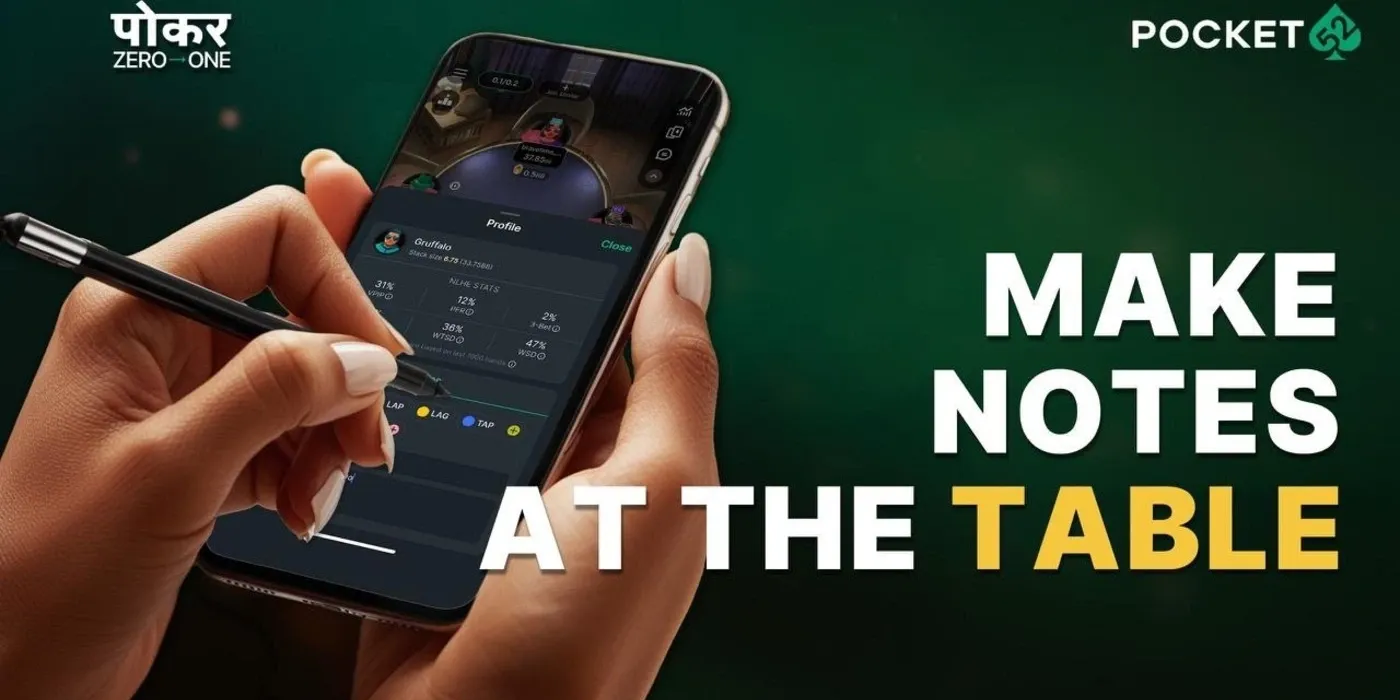- Home >
- Poker World >
- How to Make Notes in Online Poker?

How to Make Notes in Online Poker?
In poker, you’ll come across a wide range of crazy player types. If you’re playing 150–200 hours a month or going through 200–300K hands, and you’re not taking notes on these players, you’re missing out. The real fun begins when you’re seated at a cash table, and a new player joins. You realize you’ve marked them with a color, like blue, indicating something specific. Now you know exactly how to play against them and quietly win money.
Table of Contents
But if someone else has taken notes on this player and you haven’t, they’ll exploit them, not you. You’ll just sit there thinking, “If only I had played this hand better.” That’s why making notes is very important.
Before we go further, let me mention that many pro players, like Abhirup Gupta, a well-known cash game player who’s also done a podcast with us, use this technique. Every player on his tables is color-coded. This is how you can play multiple tables efficiently, you already know each player’s tendencies and who to focus on.
When to Take Notes
You should only take notes when a player makes an abnormal play. So, what is an abnormal play?
Examples of Abnormal Plays
- A player raises pre-flop from middle position with 47 offsuit and keeps playing it aggressively. Such poker actions are good indicators of a loose or unpredictable playing style.
- A player has a very strong hand but checks the river, meaning they miss value.
- A player keeps bluffing with no story or equity behind their move.
What You Should Deduce
- A player raising with 47 offsuit? That’s an ultra-loose player.
- A player who doesn’t bet on the river with a strong poker hand? Likely scared or a “scared money” player.
- Someone who keeps bluffing despite having no strong story? They’re likely habitual bluffers.
Note these behaviors down so you can exploit them the next time.
Identifying these tendencies helps sharpen your overall poker strategy and decision-making.
How to Write Poker Notes Quickly
Online poker is fast-paced, so you don’t have much time to write detailed notes. Here’s how you can write effective short notes:
Start With Player Position
For example, in a 6-max game, if a player opens from UTG with K9 offsuit, that’s strange. You’d simply write:
UTG K9o Open
This short note will immediately remind you of the play.
Knowing player positions is also a key to understanding core poker game rules.
Use Abbreviations
If you don’t know the common terms, here’s a quick reference chart you can screenshot:
- BB: Big Blinds
- X: Check
- C: Call
- XR: Check-Raise
- XSC: Check-Call
- XB: Check-Back
- C-Bet: Continuation Bet
- CC: Cold Call
- 3B: 3-Bet
- 4B: 4-Bet
- F2T: Final Two Tables
- DB: Double Barrel
- TB: Triple Barrel
- XTS: Check to Showdown
- FE: Fold Equity
- LC: Limp Call
- SSS: Three spades on board
You can adjust these abbreviations to suit your style.
Note-Taking Example
Example 1
Imagine a player in the cut-off goes all-in with 44 for 40BB against a UTG raise.
You should write:
CO 3BS 40BB vs UTG
This way, you’ve converted a long abnormal play into a short actionable note.
Documenting such moves can be especially valuable in fast-paced poker tournaments.
Important Tips for Note-Taking
- Don’t write vague notes like “donkey” or “idiot”, they don’t help your game.
- Don’t assume anything after one hand. Observe the behavior at least twice or thrice. If it repeats, mark it as x2 or x3 to increase your confidence.
Conclusion
Note-taking in poker is simple but powerful. Use abbreviations. Write them fast. It might not seem useful at first, but over time, the information compounds. If you play frequently on one site, you’ll eventually have notes on every regular player. You’ll play with more insight than your opponents, and that’s how you crush the field.
 Call support
Call support RNG certified
RNG certified Responsible gaming
Responsible gaming Safe & secure payments
Safe & secure payments ISO certified company
ISO certified company
